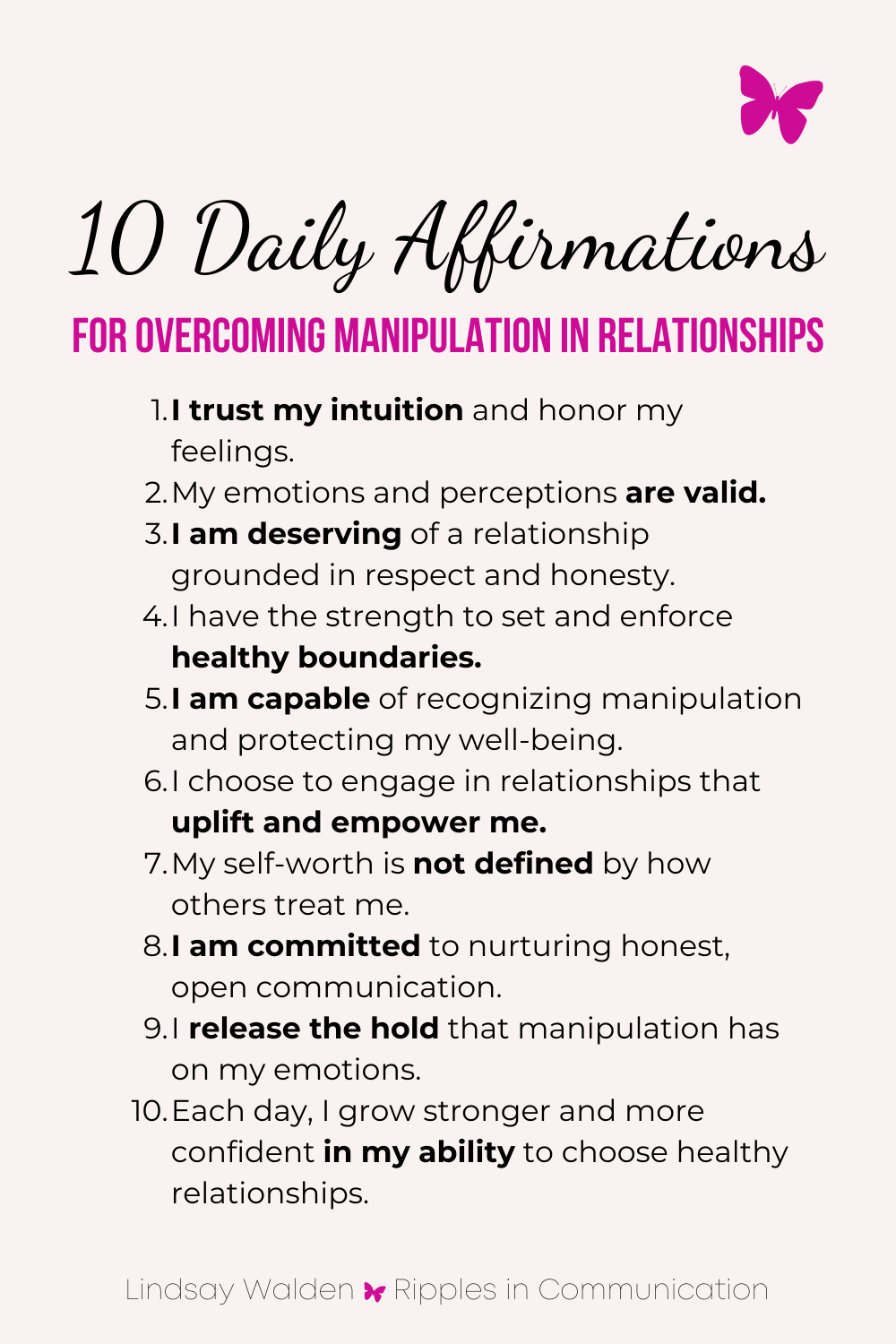How to Know Your Partner is Manipulating You
Signs Your Partner Might Be Manipulating You: a Deep Dive
I have seen many instances where the fine line between healthy communication and manipulation in relationships blurs. This realization hits hard, often leaving individuals questioning their sanity and wrestling with a whirlwind of self-doubt in relationships. As a licensed couples and sex therapist, I've observed how manipulation can masquerade as love, making it difficult to discern its presence. Emotional manipulation, gaslighting, and deceptive behaviors stand as stark relationship red flags that demand our attention. It's not just about spotting these signs but about building trust, setting boundaries, and nurturing a space for honest conversations. This journey of recognition leads to personal empowerment, allowing us to foster intimate relationships grounded in respect and understanding, free from the shadows of emotional abuse.
Key Takeaways:
Recognizing manipulation in relationships is a step towards safeguarding one's emotional well-being.
Setting boundaries and honest conversations are crucial in transforming manipulative dynamics into healthy communication.
Personal empowerment emerges from understanding and navigating these challenging scenarios with courage and clarity.
Have you gotten my FREE Relationship Communication Guide yet? Start building an authentic, conscious, and thriving relationship with your partner TODAY. Say goodbye to misunderstandings, conflicts, and missed opportunities for a deeper connection. These are the same tips and practical advice I give to my clients every day. With this guide, you'll be equipped to navigate any communication challenge and build a strong and fulfilling bond with your partner. Click the button below to enter your email address and I will send the guide to your inbox right away!
Understanding Manipulation
Within the dynamics of a relationship, manipulation embodies a deceptive strategy employed to gain power or control, often cloaked in subtlety. This emotional manipulation might not present itself through overtly malicious actions; rather, it weaves through the fabric of interactions in ways that might initially seem innocuous. It's woven into the dismissals of your feelings, the reshaping of your memories, and in how your doubts about the relationship are handled. The essence of manipulation lies in its ability to cast a shadow of self-doubt, making you question your perceptions and emotions. It's a hallmark of unhealthy communication, leading you away from honest conversations and into a maze of confusion and gaslighting. Recognizing these patterns is the first step toward reclaiming your power and laying the groundwork for building trust and setting healthy boundaries in your intimate relationship.
Why It Matters to You
Understanding the emotional and psychological impact of manipulation within a relationship is crucial. It not only chips away at trust but also instills a profound sense of self-doubt. You may start questioning your own feelings, decisions, and even your sanity. This erosion of self-confidence makes it challenging to assert your needs or set healthy boundaries. The effects extend beyond the individual. A bond that should be based on mutual respect and open communication becomes riddled with deceptive behaviors and emotional abuse signs. Over time, this can lead to a deep-seated feeling of isolation as you grapple with the disparity between the love you hold for your partner and the painful reality of your interactions. Recognizing these dynamics is the first step towards reclaiming your agency and initiating the journey towards a healthier, more intimate relationship.
Signs of Manipulation
Recognizing manipulation in relationships starts with awareness. Communication issues often act as the first signal. If you find discussions shifting unpredictably, you're likely facing manipulation. This deceit makes you question your sanity, a classic sign of gaslighting. Another red flag is the instillation of self-doubt, making you feel perpetually at fault. Emotional manipulation pulls at your heartstrings, making rational thought challenging. These tactics erode trust, a foundation of any intimate relationship. Addressing these relationship red flags early is crucial.
Setting boundaries and fostering healthy communication are steps towards empowerment. Seeking couples therapy can also provide therapeutic guidance. Through this process, you learn how to have honest conversations, crucial for navigating difficult discussions. Journaling can offer clarity, making it easier to recognize patterns and deceptive behaviors. Understanding these signs empowers you to make informed decisions about your relationship.
Unveil the top 10 signs that reveal manipulation in your relationship. Protect your emotional well-being by staying informed.
10 Signs Your Partner Might Be Manipulating You
1. Constant Blame Shifting
When every disagreement or problem is somehow your fault, even when logically it's not, this is a classic sign of manipulation. Manipulators often shift blame to avoid accountability, making you feel like you're always in the wrong and increasing your dependence on their approval.
2. Frequent Gaslighting
Gaslighting is a psychological tactic used to make you question your own memories, perceptions, or sanity. If your partner repeatedly denies events happened as you remember or suggests you're misremembering details, it's a serious red flag. This technique undermines your trust in yourself and skews the power dynamic in their favor.
3. Isolation Tactics
Manipulators may try to isolate you from your support network, suggesting friends and family don't have your best interests at heart or outright demanding you spend less time with them. This isolation makes you more dependent on the manipulator for emotional support and validation.
4. Love Bombing Followed by Withdrawal
Initially, a manipulative partner might shower you with excessive affection, gifts, and promises for the future (love bombing) to win you over. Once they feel you're committed, they withdraw this affection, leaving you craving it and more willing to do whatever it takes to get it back.
5. Using Guilt as a Tool
Manipulators are adept at making you feel guilty for their mistakes or shortcomings. They might imply that you're not supportive, loving, or attentive enough when you push back against their requests or stand up for yourself, leveraging your empathy to meet their needs.
6. Inconsistent Behavior
The unpredictability of swinging between warm affection and cold distance keeps you off-balance. This inconsistency can create a cycle of trying to elicit the "good" side of your partner, tying your emotional state to their whims.
7. Passive-Aggressive Communication
Instead of expressing dissatisfaction or disagreement openly, a manipulative partner might resort to passive-aggressive behavior. This indirect form of expression can include sulking, backhanded compliments, or procrastination on agreed tasks, leaving you confused about their true feelings.
8. Financial Control
A manipulator might control or closely monitor your spending, criticize your financial decisions, or restrict access to joint funds. This control is a form of financial abuse, aiming to limit your autonomy and freedom.
9. Playing the Victim
Even when they're clearly in the wrong, a manipulative partner might twist the story to make themselves seem like the victim. This manipulation not only diverts attention from their behavior but also seeks to elicit sympathy and reduce scrutiny on their actions.
10. Withholding Affection as Punishment
Withholding affection, intimacy, or even communication can be a manipulative tactic to punish you for not conforming to their wishes. This behavior conditions you to associate compliance with their needs and desires as the only way to receive love and attention.
Confusion and Gaslighting
At times, confusion envelops you like a thick fog, making the solid ground of your reality seem suddenly unsure. This feeling, unsettling as it may be, is a hallmark of both gaslighting and emotional manipulation. Master manipulators wield confusion as a strategic weapon, aiming to disorient and destabilize you. They'll often contradict past statements or deny events occurred, leaving you questioning your memory and sanity. This tactic of gaslighting serves a dual purpose: it erodes your trust in your own perceptions while increasing your reliance on the manipulator's version of reality.
What's particularly insidious about these tactics is their subtlety. They unfold in the day-to-day interactions you might not scrutinize until the cumulative weight of doubt becomes too heavy to ignore. By this stage, the perpetrator of emotional manipulation has often woven a narrative that positions them as indispensable, further entangling you in their web of deception. Recognizing these patterns early becomes critical in reclaiming your clarity and confidence.
Shifting Conversations
Shifting topics abruptly in a discussion serves as a masterful technique for emotional manipulation. This approach creates a labyrinth of confusion, making you question your own understanding of the conversation. Notably, this act isn't always glaringly obvious. At times, it unfolds subtly, causing self-doubt in relationships to burgeon. It can be challenging to pinpoint if it's happening in real-time. However, recognizing this pattern is crucial in identifying manipulation in relationships. By acknowledging the tactic, you start building trust in your perceptions again, which is essential in fostering healthy communication. Encountering this behavior might signal a need for setting boundaries, or possibly seeking couples therapy to address underlying issues. Navigating difficult conversations becomes easier once you arm yourself with awareness and the confidence to trust your experiences.
The Importance of Trusting Yourself
Listening to that inner voice matters more than one might understand initially. At times, we doubt our perceptions, suspecting manipulation in relationships but hesitate to trust our feelings. This hesitation can stem from communication issues that cloud our judgment or from emotional manipulation that fosters self-doubt in relationships. However, the first step towards navigating these treacherous waters is acknowledging the power of our intuition. When something doesn't feel right, it's essential to pause and reflect on that discomfort.
Recognizing manipulation requires courage and honesty with oneself. It involves identifying relationship red flags, such as gaslighting or deceptive behaviors, that may indicate emotional abuse signs. Building trust within oneself paves the way for setting healthy boundaries and seeking therapeutic guidance if needed. Remember, journaling for clarity might offer a deeper understanding of your emotions and the dynamics at play, reinforcing the belief that your experiences and feelings are valid.
Discover how to recognize the subtle signs of emotional manipulation in your partner and what you can do about it.
Confronting Your Doubts
Realizing you might be experiencing manipulation can shake the foundation of trust in your relationship. It's a profound moment of clarity, yet one fraught with self-doubt. Acknowledging these doubts is your first step towards regaining your agency. My advice is to approach the sensitive subject with a combination of courage and self-compassion. Confront the uncomfortable truth that your perceptions and feelings are valid. It's not an easy path, but essential for your own well-being.
Begin a dialogue with your partner. State your feelings clearly, without accusation, but with firm resolve. This isn't about casting blame but seeking understanding and change. Remember, healthy communication forms the bedrock of any intimate relationship. It’s vital for both parties to feel heard and validated. Should this approach not lead to the clarity you need, seeking therapeutic guidance from a couples therapy professional could offer invaluable insights and strategies to rebuild trust and set healthy boundaries.
Seeking Professional Help
In situations where manipulation within intimate relationships casts shadows of doubt, seeking professional help or counseling emerges as a beacon of clarity. Couples therapy, grounded in principles of healthy communication, can illuminate deceptive behaviors, tailoring a pathway to emotional enlightenment. Therapeutic guidance, far from a sign of defeat, represents a bold step toward personal empowerment and mutual understanding. It arms individuals and couples alike with tools for building trust, setting boundaries, and navigating difficult conversations. I work extensively with clients who are meandering their way through relationships with partners who display manipulative behaviors. I understand what you are going through and the support needed as you guide yourself out of the dark and onto the other side where you regain your self-trust, self-confidence, and self-worth.
Journaling for clarity, an exercise often recommended by therapists, can play a pivotal role. It allows for the tracking of communication issues and emotional manipulation instances, serving as undeniable evidence in moments clouded by self-doubt. Consultation with a licensed professional, adept in addressing relationship red flags such as gaslighting and emotional abuse signs, can dramatically alter the course of a relationship veering toward the rocks. It's about finding courage, honesty, and eventually, a renewed sense of self within the partnership.
The Role of Therapeutic Guidance
Therapy has proven its worth in untangling the complex threads of emotional manipulation in relationships. It serves as a beacon, guiding individuals through the murky waters of doubt and confusion. In sessions, I work closely with clients to unveil the subtle signs of manipulation, often veiled in normalcy.
In this safe space, you can voice your deepest concerns without fear of judgment. Therapeutic guidance facilitates a journey towards personal empowerment, enabling you to build trust in your own perceptions again. It's here that many find the courage to confront deceptive behaviors, setting boundaries that protect their peace. Moreover, therapy enlightens individuals on the importance of honest conversations, not just with their partners, but with themselves, ensuring a foundation of strong, healthy communication. As you navigate these difficult conversations, therapeutic support offers clarity, helping to distinguish between genuine concern and emotional abuse signs, a crucial step in healing and rebuilding.
Journaling for Clarity
Understanding the role journaling plays in revealing manipulative patterns within relationships is crucial. This technique extends beyond mere documentation. It serves as a mirror reflecting the undercurrents of emotional manipulation potentially distorting the intimacy and trust foundational to couples. Through keeping detailed notes or a journal, individuals find themselves equipped with a tangible record of conversations and incidents. This record becomes indisputable evidence, challenging the fog of confusion gaslighting and deceptive behaviors often bring.
As I've seen in my practice, this approach aids in recognizing the repetitive nature of certain dynamics — ones that might otherwise go unnoticed in the heat of the moment. Journaling for clarity isn't merely about capturing words; it's about tracking shifts in your emotional landscape, setting boundaries, and understanding your own thresholds in the relationship. It empowers you to see patterns of manipulation in relationships, hence pivotal in navigating difficult conversations with honesty and courage. In essence, it fosters self-doubt in relationships transitioning into personal empowerment and therapeutic guidance.
Setting Healthy Boundaries
Establishing and maintaining healthy boundaries stands as a fundamental pillar in forging resilient, manipulation-free relationships. It signals to your partner that you respect yourself and demand equal respect in return. Setting boundaries is no small task; it necessitates a deep understanding of one's values, desires, and limits. It empowers individuals, offering a robust framework within which both parties can navigate the complexities of emotional manipulation, communication issues, and relationship red flags efficiently. Boundaries enforce a necessary separation where personal empowerment thrives, laying the groundwork for honest, open conversations.
Those adept at setting boundaries excel in recognizing deceptive behaviors and gaslighting, swiftly navigating difficult conversations towards resolution or mutual understanding. This assertive stance fosters healthy communication, crucial for the survival of any intimate relationship. Moreover, boundaries act as guardians against emotional abuse, setting a clear line that, when crossed, signals a need for immediate action, whether it be therapeutic guidance, couples therapy, or more drastic measures to preserve one's emotional well-being. Ultimately, boundaries are not just a defense mechanism; they are affirmative statements of self-worth and personal empowerment in the dynamic dance of relationships.
Navigating Difficult Conversations
Approaching and conducting conversations about potential manipulation in your relationship requires honesty and immense courage. You may find yourself wrestling with self-doubt in relationships, fearing emotional manipulation, or perhaps even suspecting gaslighting. The key lies in setting boundaries and building trust, foundations upon which healthy communication can flourish. Initially, recognizing manipulation should stem from a place of understanding, a realization that intimate relationships ought never to leave room for deceptive behaviors.
Begin by journaling for clarity; document instances that left you questioning the dynamics. This act, simple yet significant, aids in navigating difficult conversations. Trusting yourself serves as your compass. If conversations abruptly shift, causing confusion, it’s essential to address these incidents directly.
In discussing these matters, choose a moment of calm, free from the heat of confrontation. Express your feelings without accusation, focusing on your emotional experience rather than the presumed intentions behind your partner’s actions. Seek couples therapy if the waters prove too turbulent to navigate alone. Therapy provides not only therapeutic guidance but also empowers both partners towards achieving an honest, authentic connection, effectively countering manipulation in relationships with unwavering courage and clear communication.
Empowerment Through Awareness
Throughout our exploration, we've illuminated the complex terrain of manipulation in relationships, underscoring the pivotal role of communication issues and relationship red flags. By deconstructing the subtle art of emotional manipulation, we've uncovered how it manifests through gaslighting and deceptive behaviors, challenging the very foundation of trust and intimacy. Yet, amidst these challenging dynamics, the beacon of building trust, setting boundaries, and fostering healthy communication shines brightly as a pathway to reclaiming personal power.
Recognizing the signs of emotional abuse requires a sharpened sense of awareness—one that I've aimed to nurture through this deep dive. Self-doubt in relationships often emerges as a manipulator's most potent weapon. However, by adopting a stance of personal empowerment and engaging in honest conversations, you can begin to dismantle these pernicious patterns. Therapeutic guidance and journaling for clarity serve as invaluable tools in this journey, offering a reflective space to untangle the web of confusion and to recognize manipulation.
Armed with this knowledge, the call to action becomes clear: embolden yourself through increased awareness and take decisive steps towards navigating difficult conversations with courage and clarity. Remember, in the quest for a genuinely intimate relationship, the ultimate guidance can often be found within. Trusting your intuition, setting robust boundaries, and seeking couples therapy if needed, are instrumental in charting a path towards healthier, more fulfilling connections. Let this exploration be your first step towards empowerment, as you confidently navigate the complex relational landscapes ahead.
Empower yourself with these 10 daily affirmations designed to help you recognize and overcome manipulation in relationships. Reclaim your emotional autonomy and pave the way for healthier, more respectful connections.







